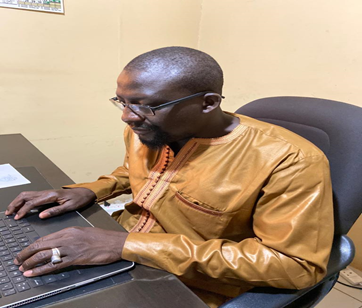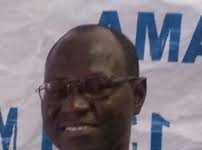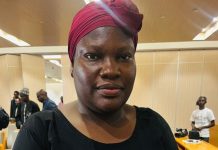By Ndey Sowe
Muhammed Krubally, a lawyer by profession and the Gambia’s first and only visually impaired magistrate and the Chairperson of the Gambia Federation of the Disabled (GFD), has disclosed that the passing of the Disability Bill 2021 means upholding the sovereignty of all citizens.
“Gambia Federation of The Disabled (GFD) hopes that within thirty days, the President will sign the bill into law to signify that indeed the Gambia is an equal and just society for all,” said his worship Krubally in a statement issued to this reporter on Wednesday, 18th August, 2021.
Krubally added that the Constitution of The Gambia envisages a society in which all citizens are equal in rights and dignity with the right to equal opportunities. He said this means the laws; institutions and services in the country should serve and deliver to all without any form of discrimination by design or by default.
The National Assembly passed the Disability Bill on Tuesday 6 July 2021 and it was assented to by President Adama Barrow. This happened after more than 10 years since the bill was drafted.
“Section 1 subsection 2 of the Constitution of the Republic of the Gambia states that the sovereignty of the Gambia lies in the people of the Gambia, and that public institutions derive their legitimacy and authority from the people and perform their functions on behalf of, and for the welfare of the people. Hence, all Gambians are equal as sovereign citizens regardless of disability, tribe, religion, political orientation, age or sex among other statuses. This means the Government has a duty to respect, protect and fulfil the rights of all Gambians,” Krubally said.
“Section 33 of the Constitution stipulates that all Gambians are equal before the law and that no one should be treated in a discriminated manner by public institutions and officials. Since the State – as in public institutions – are the ones mandated primarily to protect all rights of citizens as set out in Section 17 of the Constitution, it therefore means persons with disabilities, having the same rights as every other citizen, must also enjoy all of the public goods, facilities and services provided by public institutions.”
Krubally strongly believed that all private businesses, CSOs, individuals and any entity in the Gambia has a duty to ensure that persons with disabilities enjoy or access the goods and services they deliver or sell to other citizens.
“Failure to ensure that persons with disabilities enjoy or access these goods and services simply because of their disability means there is discrimination,” he said.
He gave an example that if a GSM company is providing an automated message to users, it must bear in mind that some phone users are visually-impaired, hard of hearing or unable to talk hence that company must ensure that its products and services are packaged in another form such that a person with any form of disability could directly understand the message when using her phone. Krubally stated that sometimes, because a certain level of disability may not allow for direct and full participation with others to a certain level, it is necessary in those cases that events, services and facilities be created for those disability communities on their own so they enjoy their rights.
Magistrate Krubally said one example of such is the special Olympics, saying at the minimum, all stakeholders must ensure that there is reasonable accommodation in the goods, services, facilities, events and activities they deliver so that persons with disabilities could also enjoy them to the largest extent.
“The passing of this bill therefore can be considered to be recognition that indeed all citizens are equal members of society. In society, people belong to various communities such as male and female, young and old, ethnic groups, religions, political parties, regions, and bearing different names and origins.
“This shows that diversity is the nature of society and human beings, hence a right. This diversity is the cornerstone of unity since unity presupposes difference. Hence difference does not mean less or low, rather difference only shows the diversities that exist in society which must be recognised, protected and supported,” Krubally added.
By passing this bill, Krubally said the Gambia has given practical meaning to the concept of equal sovereignty of all citizens, adding that having had the Children’s Act and the Women’s Act, the Disability Act will now complete the idea of equality in society for all sectors of the population.
He noted these laws recognise that there are some sectors of the population who are marginalised because of age, gender and disability based on certain sociocultural beliefs. For that matter, he added that these laws are created to protect rights and also highlight the need for the removal of oppressive, exploitative and discriminatory social and cultural beliefs and practices that have lived within this society for so long.
“Hence, as a republic since 1970, The Gambia should have had a disability law as well as laws protecting children and women and other marginalised groups since the first day of independence,” he emphasized.
Writing further, Krubally said now that the law is passed and assented to by the President within the 30 days requirement vested in him by law, from the 6th July to 7th August 2021, one “Must” emphasise that the full implementation of this law shall not take that long as the making of the law itself. In other words, he said it is not enough to recognise the exclusion and marginalisation of these groups by creating this law, but that the Government needs to go further by enforcing the laws in full at all times within the shortest time possible.
Krubally said it is therefore, and also necessary that the Gambia Government undertakes urgent and comprehensive efforts immediately to review other laws as well as reform institutions to ensure that they are all disability compliant.
“It is also necessary that private enterprises, communities, businesses and individuals are made to understand this law and abide by it,” Krubally reiterated.
Krubally emphasised that there is need for a comprehensive national disability survey to ascertain the state of disability in the country. A disability assessment, he said, is necessary to determine the kind of disabilities that exist, hence the kind of support services to deliver in meeting the rights and needs of persons with disabilities. Such data collection, he went on, must be continuous, consistent and comprehensive. The lawyer added that it is a shame that since the last disability survey in 1998, no such survey has ever been conducted in this country until today. The rights of persons with disabilities cannot be protected in the absence of correct and up to date data, he noted.
“The implementation of this law is not merely a government obligation. Rather, it is both a legal and moral duty on each and every person and entity in The Gambia to ensure that this society is just, equal and without any form of discrimination. Not only is it a matter of justice and right, but it serves the overall social and economic wellbeing of the Gambia to have a society where all citizens have the opportunity to grow to their fullest potential in order to live life of dignity and be able to contribute their quota to national development,” Krubally stated.
Krubally called on Gambians to remember that anyone could become disabled at any time in their lifetime on account of accident, sickness or by some other condition. When that happens, he said one would wish there is a just system to enable him/her to overcome their difficulties and challenges and access opportunities to reach their fullest potential and ability.
While saying this is a historic moment in The Gambia, Krubally said the Gambia Federation of the Disabled extend sincere thanks to President Adama Barrow, all the National Assembly Members, UNDP, ARTICLE-19, Minister of Gender, Children and Social Welfare, Civil Society Organisations and all their esteem partners who stood in solidarity with them to making the bill a success.



















